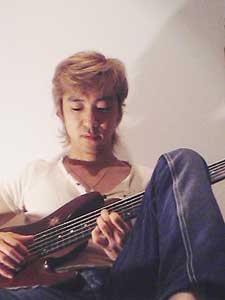![[Metroactive Music]](/gifs/music468.gif)
[ Music Index | Santa Cruz | Metroactive Home | Archives ]

Ryusei Hattori, one of this year's headliners, gets loopy with his wide-neck bass. Loop Gurus Loopfest main man Rick Walker techs no prisoners By Bill Forman ike a runaway feedback loop, Rick Walker's adventures in electronic music continue to grow. The prime mover behind the upcoming fifth annual Live Looping Festival, he'll play host to 48 artists from seven countries, all pushing the live performance potential of digital looping technology. "I have people come up to me all the time now and go, "God, I remember when you used to play drums,'" says the former world music percussionist. "Just this week, I played zerna, shinai, a shitload of shakuhachi flute; I also spent several hours playing cello and piano; and I played clarinet and kanjira, which is the only drum I even touched this week." All of which is not to suggest that Walker doesn't still like to hit things; it's just that the former drummer finds more satisfaction in exploring new sounds: "The liberation for me has been the fact that now all I think is texture, harmony, rhythm and processing. I'm not bound by the older rules like, 'Oh well, if you're gonna play clarinet, you're gonna have to devote 20 years of your life in order to get to a certain place on it. I just need to be able to play it well enough that I can do a really beautiful passage on it. And so, if you look at old-school musicians, they're aghast at this technology in certain ways." Yet many proficient players of traditional instruments are beginning to embrace looping technology, which enables a solo performer to create complex arrangements by building layer upon layer of musical elements. Among them are two of this year's headliners, Ryusei Hattori and Hideki Nakanishi, Japanese musicians whom Walker met at the International Looping Festival in Zurich. "Ryusei is a six-string fretless bass player, and he just sort of makes a symphony out of six-string bass with all his looping stuff," Walker enthuses. "And Hideki is a mandolin player who has really gotten into digital signal processing. And so he's able to process his mandolin so that it plays deep subsonic bass lines, so it sounds like drums, ambient pads or searing lead guitars, all through processing. And they're both really great players as well." Walker's own history with the technology goes back to Tao Chemical, his band with nascent astrology columnist Rob Brezsny and ambient-inclined guitarist Michael Haumesser. "Back in '81 and '82, Michael started making his own tape loops by opening up cassettes and then just literally splicing the tape together," says Walker, who recalls doing an all-Echoplex-driven concert as Tao Electrical shortly thereafter. By 1995, Walker had gotten hold of one of the first digital looping machines and there was no turning back. And while some traditionalists may dismiss digital technology as an easy way out, Walker insists this is the most challenging music he's done. "It's difficult to loop live; you've got to play well and you've got to have exquisite timing," says Walker. "I've learned more about timing from doing live looping than I have from playing with master African and Indian drummers, and that's the truth."
The Santa Cruz Live Looping Festival, Noon-midnight Saturday and Sunday, Oct. 8-9, E3 Playhouse (in the old Cymbaline Records Building at Front and Cathcart), Santa Cruz. Additional performances in Big Sur and San Francisco. [ Santa Cruz | Metroactive Central | Archives ]
|
From the October 5-12, 2005 issue of Metro Santa Cruz.
Copyright © 2005 Metro Publishing Inc. Maintained by Boulevards New Media.
For more information about Santa Cruz, visit santacruz.com.